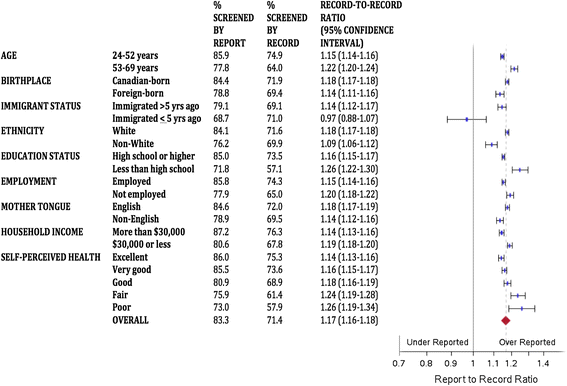The validity of self-reported cancer screening history and the role of social disadvantage in Ontario, Canada
- PMID: 25630218
- PMCID: PMC4319224
- DOI: 10.1186/s12889-015-1441-y
The validity of self-reported cancer screening history and the role of social disadvantage in Ontario, Canada
Abstract
Background: Self-report may not be an accurate method of determining cervical, breast and colorectal cancer screening rates due to recall, acquiescence and social desirability biases, particularly for certain sociodemographic groups. Therefore, the aims of this study were to determine the validity of self-report of cancer screening in Ontario, Canada, both for people in the general population and for socially disadvantaged groups based on immigrant status, ethnicity, education, income, language ability, self-rated health, employment status, age category (for cervical cancer screening), and gender (for fecal occult blood testing).
Methods: We linked multiple data sources for this study, including the Canadian Community Health Survey and provincial-level health databases. Using administrative data as our gold standard, we calculated validity measures for self-report (i.e. sensitivity, specificity, positive and negative likelihood ratios, positive and negative predictive values), calculated report-to-record ratios, and conducted a multivariable regression analysis to determine which characteristics were independently associated with over-reporting of screening.
Results: Specificity was less than 70% overall and for all subgroups for cervical and breast cancer screening, and sensitivity was lower than 80% overall and for all subgroups for fecal occult blood testing FOBT. Report-to-record ratios were persistently significantly greater than 1 across all cancer screening types, highest for the FOBT group: 1.246 [1.189-1.306]. Regression analyses showed no consistent patterns, but sociodemographic characteristics were associated with over-reporting for each screening type.
Conclusions: We have found that in Ontario, as in other jurisdictions, there is a pervasive tendency for people to over-report their cancer screening histories. Sociodemographic status also appears to influence over-reporting. Public health practitioners and policymakers need to be aware of the limitations of self-report and adjust their methods and interpretations accordingly.
Figures
Similar articles
-
Validation of self-reported history of colorectal cancer screening.Can Fam Physician. 2007 Jul;53(7):1192-7. Can Fam Physician. 2007. PMID: 17872816 Free PMC article.
-
Using self-reported data on the social determinants of health in primary care to identify cancer screening disparities: opportunities and challenges.BMC Fam Pract. 2017 Feb 28;18(1):31. doi: 10.1186/s12875-017-0599-z. BMC Fam Pract. 2017. PMID: 28241787 Free PMC article.
-
Primary care physician characteristics associated with cancer screening: a retrospective cohort study in Ontario, Canada.Cancer Med. 2015 Feb;4(2):212-23. doi: 10.1002/cam4.358. Epub 2014 Nov 27. Cancer Med. 2015. PMID: 25430885 Free PMC article.
-
Agreement between self-reported and registered colorectal cancer screening: a meta-analysis.Eur J Cancer Care (Engl). 2015 May;24(3):286-98. doi: 10.1111/ecc.12204. Epub 2014 Apr 23. Eur J Cancer Care (Engl). 2015. PMID: 24754544 Review.
-
Developing and validating key performance indicators for breast, cervical, and colorectal cancer screening programs: a literature review and Delphi survey.Front Public Health. 2025 Apr 3;13:1491226. doi: 10.3389/fpubh.2025.1491226. eCollection 2025. Front Public Health. 2025. PMID: 40247870 Free PMC article. Review.
Cited by
-
Differences in colorectal cancer screening rates across income strata by levels of urbanization: results from the Canadian Community Health Survey (2013/2014).Can J Public Health. 2019 Feb;110(1):62-71. doi: 10.17269/s41997-018-0143-5. Epub 2018 Oct 23. Can J Public Health. 2019. PMID: 30353502 Free PMC article.
-
Area-level income disparities in colorectal screening in Canada: evidence to inform future surveillance.Curr Oncol. 2019 Apr;26(2):e128-e137. doi: 10.3747/co.26.4279. Epub 2019 Apr 1. Curr Oncol. 2019. PMID: 31043818 Free PMC article.
-
Cervical cancer screening among incarcerated women.PLoS One. 2018 Jun 26;13(6):e0199220. doi: 10.1371/journal.pone.0199220. eCollection 2018. PLoS One. 2018. PMID: 29944694 Free PMC article.
-
Colorectal Cancer Screening Prevalence and Adherence for the Cancer Prevention Project of Philadelphia (CAP3) Participants Who Self-Identify as Black.Front Oncol. 2021 Jul 30;11:690718. doi: 10.3389/fonc.2021.690718. eCollection 2021. Front Oncol. 2021. PMID: 34395256 Free PMC article.
-
Effect of a community-based intervention to increase participation in cervical cancer screening among Pakistani and Somali women in Norway.BMC Public Health. 2021 Jun 30;21(1):1271. doi: 10.1186/s12889-021-11319-1. BMC Public Health. 2021. PMID: 34193096 Free PMC article.
References
-
- Canadian Cancer Society/National Cancer Institute of Canada. Canadian Cancer Statistics2006, Toronto, Canada, 2006.
-
- Wilkins K, Shields M. Colorectal cancer testing in Canada--2008. Health reports / Statistics Canada, Canadian Centre for Health Information = Rapports sur la sante / Statistique Canada, Centre canadien d’information sur la sante. 2009;20(3):21–30. - PubMed
Publication types
MeSH terms
Grants and funding
LinkOut - more resources
Full Text Sources
Other Literature Sources
Medical




